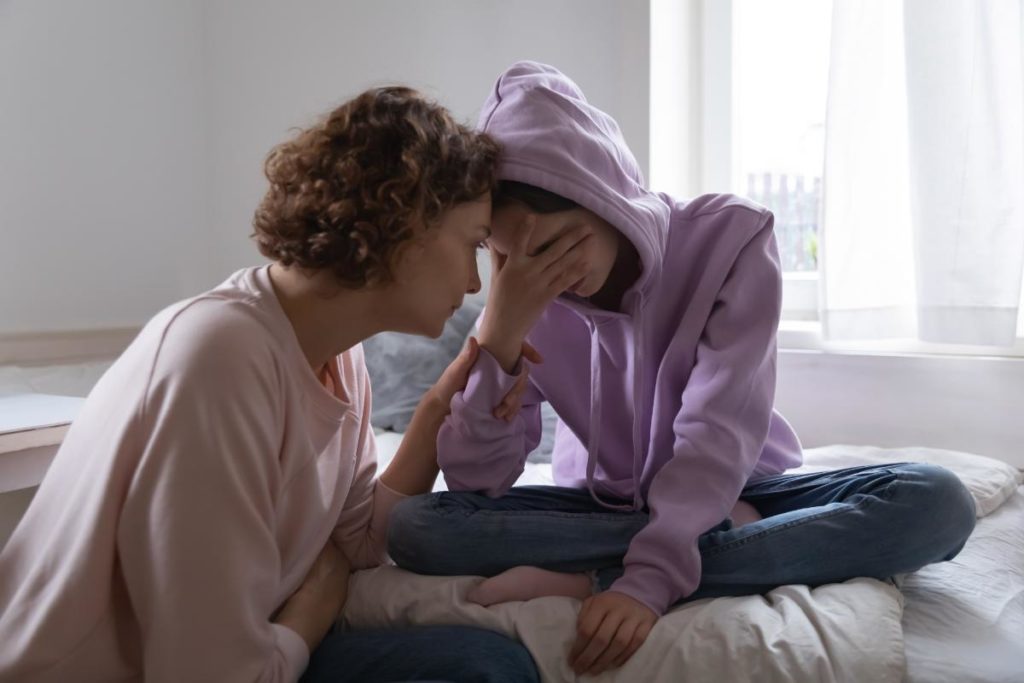With a 24-hour news cycle, people are constantly bombarded with information in today’s fast-paced society. It can feel like you’ve barely processed a tragedy before there is something else to face. This pace gives individuals little time to grieve their losses, which have compounded over the last two years of the COVID-19 pandemic. This is a lot for anyone to manage but is particularly challenging for teens. Many teens have not learned how to grieve or support someone else who is grieving. They discover that grief and loss are inevitable, and they need to learn to move on. Teens who struggle to process grief effectively are at risk for mental health and substance use disorders. A grief and loss therapy program can provide teens with the tools to properly process grief.
Imagine Nampa is a day treatment program for teens ages 12-17. We offer comprehensive mental health treatment in a safe, supportive, and inclusive environment. If your teen is grieving or is struggling to cope with their grief, grief counseling can help them understand and process their feelings. Reach us at 888.503.4604 to learn more.
What Are Grief and Loss?
Grief is the normal emotional response to the death of a loved one or another significant loss. Everyone processes grief differently. However, there are clearly defined stages of grief:
- Shock and denial
- Pain and guilt
- Anger and bargaining
- Depression, reflection, and loneliness
- The upward turn
- Reconstruction and working through
- Acceptance and hope
The stages of grief are not linear, meaning that they can happen in any order. It is important to teach teens that grief is a process and a journey. Personal factors that impact a person’s grief include emotional regulation, cognitive functioning, coping style, history of trauma, secondary stressors, and access to support.
There Are Different Types of Loss
Most people associate grief with the death of a loved one. However, numerous types of loss can result in teen grief, including:
- Breakups, parental separation or divorce, and the ending of friendships can create a sense of abandonment. This feeling can be as devastating for teens as the death of a loved one.
- The loss of physical ability from illness or injury can be a source of teen grief, especially for athletes whose identity is strongly linked to their athletic ability.
- Teens often struggle with their sense of self. Especially after trauma or loss, teens may struggle to re-establish who they are.
- Rising numbers of school shootings and active shooter drills cause many teens to grieve over losing a sense of safety and security.
There is no set timeline for grief or right or wrong emotions. However, if your teen is struggling to cope with their grief in healthy ways, or if they seem not to be getting better after a couple of months, a grief and loss therapy program can help.
Symptoms Associated with Grief and Loss
Grief often presents as depression or intense sadness surrounding the loss. Other signs and symptoms of grief include:
- Anger and irritability
- Excessive focus on the loss or complete avoidance of it
- Hopelessness about the future
- Difficulty managing daily activities or adjusting to a new routine
- Sleep issues including nightmares, insomnia, or hypersomnia
- Changes in eating habits, including not eating or overeating
- Isolating or withdrawal from friends and family
Parents play an essential role in how teens cope with grief and loss. It is critical for teens to know that the only way to get through the grieving process is by experiencing their feelings even though they are uncomfortable. Parents would watch out for unhealthy coping skills, including substance use or self-harm.
Contact Imagine Nampa if Your Teen Needs Help Coping with Loss
The grief and loss therapy program at Imagine Nampa helps teens ages 12-17 healthily process the complex feelings associated with the grieving process. In a safe, supportive environment, teens learn healthy coping skills. Our grief and loss therapy program can help teens overcome new or worsening mental health issues. Some of the evidence-based therapies we offer include:
- Cognitive-behavioral therapy (CBT)
- Dialectical behavior therapy (DBT)
- Interpersonal therapy
- Mindfulness and meditation
- Art and music therapy
- Pet therapy
- Trauma therapy
A significant loss in adolescence can be devastating and have long-term impacts on your teen’s mental and physical well-being. Imagine Nampa can help. Contact us online or by calling 888.503.4604.

